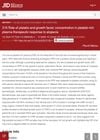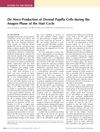 January 2024 in “Dermatologic Therapy”
January 2024 in “Dermatologic Therapy” PRP therapy with specific growth factors improves hair density and thickness in androgenic alopecia.
 August 2023 in “Dermatologic Surgery”
August 2023 in “Dermatologic Surgery” Person-to-person hair transplants can work for patients on lifelong immunosuppression, with high hair growth success.

The document concludes that activating hair roots is important for improving hair growth and preventing hair loss.
May 2023 in “Hair transplant forum international” Oral minoxidil shows promise for hair growth but needs more research on dosing and side effects.
 July 2022 in “Journal of Investigative Dermatology”
July 2022 in “Journal of Investigative Dermatology” High platelet numbers in PRP may not be essential for hair growth, and certain growth factors could negatively affect treatment outcomes for hair loss.
 January 2022 in “Clinical dermatology open access journal”
January 2022 in “Clinical dermatology open access journal” Certain cannabinoids may help increase hair growth and could be useful for treating hair loss.
 November 2019 in “Harper's Textbook of Pediatric Dermatology”
November 2019 in “Harper's Textbook of Pediatric Dermatology” Understanding normal hair growth and loss in children is key to diagnosing and treating hair disorders.
Cinnamon oil works as well as minoxidil for hair growth.
January 2018 in “Social Science Research Network” Certain small molecules that trigger cell cleanup processes can promote hair growth.
 October 2013 in “Journal of Investigative Dermatology”
October 2013 in “Journal of Investigative Dermatology” Collagen VII helps skin heal and stay strong, sirolimus may lower skin cancer risk in kidney transplant patients, high-molecular-mass hyaluronan helps naked mole rats resist cancer, dermal γδ T cells aid in hair growth in rodents, and overexpression of IL-33 in mouse skin causes itchiness, offering a model for studying allergic inflammation treatments.

Human scalp hair follicles have PGE2 and its receptors, which might affect hair growth.
 June 2013 in “Faculty Opinions – Post-Publication Peer Review of the Biomedical Literature”
June 2013 in “Faculty Opinions – Post-Publication Peer Review of the Biomedical Literature” A substance called FGF9 from certain immune cells can trigger new hair growth during wound healing in mice, but humans may not have the same response due to fewer of these cells.
 June 2013 in “Faculty Opinions – Post-Publication Peer Review of the Biomedical Literature”
June 2013 in “Faculty Opinions – Post-Publication Peer Review of the Biomedical Literature” FGF9 from certain cells can trigger new hair growth during wound healing, but humans have fewer of these cells, which may limit hair regrowth.
Retinoic acid affects hair growth and can cause hair loss.
Melatonin helps regulate hair growth and may treat hair loss.
Procyanidins and phosphatidic acids help promote hair growth.
Dr. SKS Hair Booster Serum is safe and effective for reducing hair fall and promoting hair growth.
August 2022 in “International Journal of Molecular Sciences” DNA methylation controls lncRNA2919, which negatively affects hair growth.

Integrin alphavbeta6 is important for wound healing and hair growth, and blocking it may improve these processes.
 155 citations,
August 2003 in “Journal Of Experimental Zoology Part B: Molecular And Developmental Evolution”
155 citations,
August 2003 in “Journal Of Experimental Zoology Part B: Molecular And Developmental Evolution” Understanding hair growth involves complex interactions between molecules and could help treat hair disorders.
 86 citations,
July 2020 in “International Journal of Molecular Sciences”
86 citations,
July 2020 in “International Journal of Molecular Sciences” Activating the Wnt/β-catenin pathway could lead to new hair loss treatments.
 52 citations,
June 1999 in “Endocrinology and Metabolism Clinics of North America”
52 citations,
June 1999 in “Endocrinology and Metabolism Clinics of North America” Antiandrogen treatments combined with oral contraceptives can help manage hair growth and hair loss in women with PCOS.
 50 citations,
January 2007 in “PubMed”
50 citations,
January 2007 in “PubMed” Minoxidil 2% and 5% are common treatments for female pattern hair loss, with other options including anti-androgens, oral contraceptives, and hair transplantation.
 41 citations,
June 2010 in “Journal of Investigative Dermatology”
41 citations,
June 2010 in “Journal of Investigative Dermatology” New cells are added to the hair's dermal papilla during the active growth phase.
 23 citations,
December 2013 in “Regenerative Medicine”
23 citations,
December 2013 in “Regenerative Medicine” Hair follicle culture helps develop new treatments for hair loss.
 15 citations,
October 2017 in “Dermatologic Clinics”
15 citations,
October 2017 in “Dermatologic Clinics” New treatments for male hair loss show promise but need more research for safety and effectiveness.
 10 citations,
August 2018 in “Dermatologic Surgery”
10 citations,
August 2018 in “Dermatologic Surgery” Laser treatment improves hair density and increases growth factors in androgenetic alopecia.
 9 citations,
November 2020 in “Journal of Inflammation Research”
9 citations,
November 2020 in “Journal of Inflammation Research” Inflammation affects hair loss; anti-inflammatory treatments may help.
 8 citations,
April 2020 in “Facial Plastic Surgery Clinics of North America”
8 citations,
April 2020 in “Facial Plastic Surgery Clinics of North America” Minoxidil, finasteride, and low-level laser light therapy are effective FDA-approved treatments for hair loss.
 8 citations,
July 2014 in “Hair transplant forum international”
8 citations,
July 2014 in “Hair transplant forum international” Bio-enhanced hair restoration, using methods like growth factors, stem cells, and ATP, results in better hair growth and density than traditional hair transplants.






















